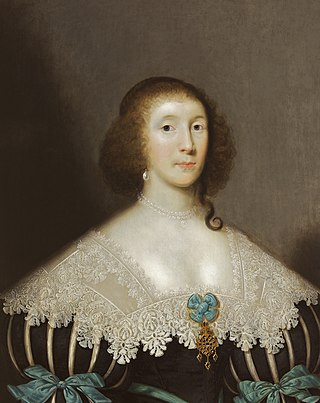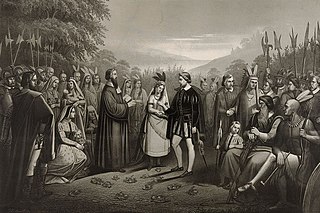Related Research Articles

"Ancient planter" was a term applied to early colonists who migrated to the Colony of Virginia when the settlement was managed privately by the Virginia Company of London. A colonist received a land grant if they remained in Virginia for at least three years. Under the terms of the "Instructions to Governor Yeardley", these colonists received the first land grants in the New World.

William Byrd I was an English-born Virginia colonist and politician. He came from the Shadwell section of London, where his father John Bird was a goldsmith. His family's ancestral roots were in Cheshire.

John Ratcliffe was an early Jamestown colonist, governor, and sea captain. Ratcliffe became the second president of the colony of Jamestown. He was slain by the Pamunkey Native Americans in the winter 1609–1610.

Edward Maria Wingfield was a soldier, Member of Parliament (1593), and English colonist in America. He was the son of Thomas Maria Wingfield, and the grandson of Richard Wingfield.
Capt. John Martin was a Councillor of the Jamestown Colony in 1607. He was the proprietor of Martin's Brandon Plantation on the south bank of the James River. Located in modern-day Prince George County, Virginia and known as Lower Brandon Plantation, in the 21st century, his c. 1616 plantation is both a National Historic Landmark and one of America's oldest continuous farming operations.

Robert Hunt, a vicar in the Church of England, was chaplain of the expedition that founded the first successful English colony in the New World, at Jamestown, Virginia, in 1607.
William Powell, was an early Virginia colonist, landowner, militia officer and legislator. Considered an ancient planter for living in the Virginia colony during its first decade, he was one of two representatives from what became James City County, Virginia in the first Virginia House of Burgesses in 1619. His former plantation, now across the James River in Surry County, Virginia is now within Chippokes State Park.
Ensign Washer or Ensign Thos (Thomas) Washer was an early Virginia colonist who settled in the area that became Isle of Wight County, Virginia. Washer and Christopher Lawne represented Lawne's Plantation as burgesses in the first assembly of the Virginia House of Burgesses, the lower house of the colonial Virginia General Assembly, in 1619.
Sir Benjamin Ayloffe, 2nd Baronet was an English landowner and politician who sat in the House of Commons from 1661 to 1662. He supported the Royalist cause in the English Civil War.

Sir Richard Moryson was an English soldier and politician who sat in the House of Commons from 1621 to 1622.
George Fawdon, also spelled in various sources as George Fawden, George Fawder, George Fadoin, George Faudon, George Fawdoune, George Faudown, George Fawdowne, and George Fowden, was an early Virginia colonist, landowner, militia officer, county court clerk, county clerk justice and legislative representative (politician). He served at least two terms as a burgess in the Virginia House of Burgesses in the 1640s and 1650s representing Isle of Wight County, Virginia.
Robert Abrahall was the first member of the Virginia House of Burgesses, the elected lower house of the colonial Virginia General Assembly, from New Kent County, Virginia, in 1654. He again served in the House in 1659–1660. He may have served in 1654–1657 since the lists of members for those years are incomplete and no members for New Kent County are shown.

Reverend Richard Buck was a minister to the Colony of Virginia at Jamestown, Virginia from 1610 to 1624. He was chaplain of the first session of the Virginia General Assembly, which was composed of the House of Burgesses and the Virginia Governor's Council. This assembly met in the church at Jamestown on July 30, 1619, as the first elected assembly and law making body in colonial America.
Thomas Herrick, sometimes spelled Thomas Hayrick or Thomas Heyrick or Thomas Heyricke was a member of the Virginia House of Burgesses, the elected lower house of the colonial Virginia General Assembly, from the "Upper Part of" Elizabeth City, Virginia, later Elizabeth City County, Virginia, now Hampton, Virginia, in 1629–1630.
John Waller was a planter, military officer and politician in the Colony of Virginia who was the effective progenitor of one of the First Families of Virginia, and who represented King William County in the House of Burgesses, and helped secure creation of Spotsylvania County, then served as its first clerk for two decades. Complicating matters, the name was common in the family and not only did this man serve as Spotsylvania's clerk, so did his sons Edmund and William and two grandsons named John, so that family members served as Spotsylvania's clerk for 64 years. Moreover, two descendants named John Waller also would serve in the Virginia House of Delegates: one from Bourbon County before creation of the state of Kentucky, and the other represented York County in the assembly of 1800 while his cousin Benjamin C. Waller represented Williamsburg, which had become the colony's capital city during this man's lifetime, and was split between York and James City Counties, but during the American Revolutionary War, Richmond had become the capital of the new Commonwealth of Virginia.
Edward Palmer was a gentleman with antiquarian interests from Gloucestershire, England. During his life he was known for his extensive collection, notably of Roman coins: William Camden called him "a curious and diligent Antiquarie". He is perhaps best remembered for his purchase of the then-unnamed Garrett Island in the American colony of Virginia, which he designated for the establishment of what would have been the first university in the English colonies.
Walthall is a surname of English extraction. Notable people with the surname include:
William Spence was an early Virginia colonist on Jamestown Island. He was member of the first assembly of the Virginia House of Burgesses in Jamestown, Virginia in 1619. Spence became an ensign in the local militia and is thus sometimes identified as Ensign William Spence or Ensign Spence. He was an early farmer on Jamestown Island, a tobacco taster and landowner at Archer's Hope. He, his wife and his young daughter, Sara, or Sarah, avoided the Indian massacre of 1622, but Spence and his wife were reported "lost" at the census of February 16, 1624.
William Spencer was an early Virginia colonist on Jamestown Island, who was an Ancient planter and a member of the Virginia House of Burgesses in Jamestown, Virginia for Mulberry Island in 1632/33.
References
- Hughes, Thomas Proctor. 'Medicine in Virginia 1607 - 1699'. Charlottesville, VA: Univ. Press of Virginia, 1970. OCLC 19030601. Retrieved March 2, 2013.
- Tyler, Lyon Gardiner, ed. Encyclopedia of Virginia biography. Volume 1. New York: Lewis Historical Publishing Company, 1915. OCLC 2576742. Retrieved July 15, 2011.
- Withington, Lothrop. 'Virginia Gleanings in England: Abstracts of 17th and 18th-century English wills and administrations relating to Virginia and Virginians: a consolidation of articles from The Virginia magazine of history and biography'. Baltimore: Genealogical Publishing Company, 1980. Reprinted 1998 by Clearfield Publishing Company. Excerpted from Virginia Magazine of History and Biography. ISBN 0-8063-0869-9. Retrieved March 2, 2013.
- Woolley, Benjamin. 'Savage Kingdom: Virginia and The Founding of English America'. New York : HarperCollins Publishers, 2007. ISBN 978-0-06-009056-2. Retrieved March 2, 2013.